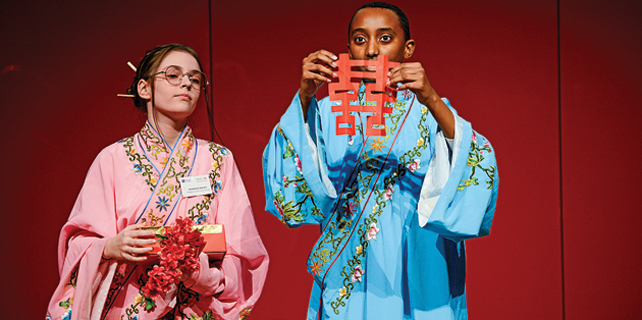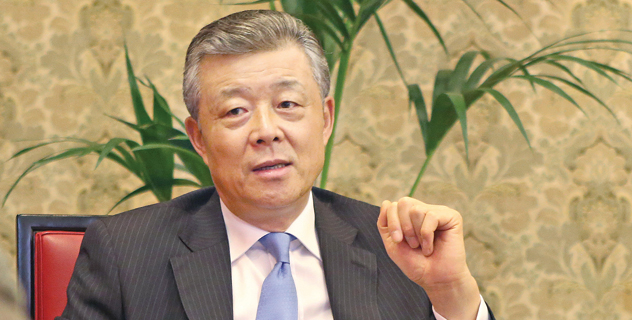China is world model for peaceful big power with positive reforms: Egypt's Al-Ahram chief
CAIRO - China provides a world model for a peaceful big power with positive, comprehensive reforms and a ruling party that has come from the people, said the board chairman of Egypt's largest state-run Al-Ahram newspaper in an exclusive interview with Xinhua.
Ahmed al-Sayyid al-Naggar, CEO of Al-Ahram Foundation, expressed appreciation of the Chinese efforts in environmental improvement, anti-corruption crackdown and military upgrade as key positive measures in China's long-term reform.
"Economically and politically, China is already an international big power. Its long-term anti-corruption model already provides a positive image complementary of its very positive economic and political image," said Al-Ahram chief.
As a frequent visitor of Beijing, Naggar sometimes noted heavy pollution in the Chinese capital city, yet he pointed out that "China has already cultivated several forests, which signals keenness to restore tree crown cover that improves environment."
As for Chinese military reform, President Xi Jinping, who is also chairman of the Central Military Commission (CMC), has been urging the People's Liberation Army (PLA) to transform into a "mighty, modernized, new-style" military force based on technology rather than number of troops.
"The upgrade of China's military force to make it smaller yet more efficient is a very positive step to reduce spending and still maintain the Chinese military at highest level of readiness, professionalism and advancement to protect the country against any possible aggression," Al-Ahram CEO told Xinhua.
Naggar continued that even during the Cold War, China as a peaceful power was not dragged into the idea of armament race and it only established sufficient weapons to protect its territories.
"China made all advanced weapons like other powers, but it was not dragged into the race of numbers," he explained.
In early March, China is scheduled to hold its "two sessions": The fifth annual session of the 12th National People's Congress (NPC), the country's top legislature, and the fifth session of the 12th National Committee of the Chinese People's Political Consultative Conference (CPPCC), the top political advisory body.
"Unlike many ruling parties made by governments, the Communist Party of China (CPC) rose from the people until it came to power. Such meetings, like the 'two sessions' coming in March, help the ruling party strongly convey the voices of the people," said Naggar.
He added that the CPC is based on collective rather than individual work as well as equal votes. "So, China's political system provides a model for collective leadership."
Al-Ahram top man stressed that through the party meetings the main topics, policies, developments and amendments raised for discussions by the NPC and the CPPCC "show the benefit of collective thinking rather than individualism."
In 2013, President Xi proposed "the Belt and Road initiative" that seeks to revive ancient trade routes to link China with countries in Asia, Africa and Europe through the Silk Road Economic Belt and the 21st-Century Maritime Silk Road.
Naggar, also one of Egypt's renowned economists, said that President Xi wanted through the initiative to present "a unique model to the world for running international relations in a peaceful manner."
"The initiative is not a mere reproduction of the ancient Silk Road. It's a reproduction of the symbolic value of the ancient trade route," he added, noting it aims to restore peaceful, fair and balanced economic cooperation regardless of military power.
"So, President Xi presents China's model for international relations based on peacefulness, contrary to the European and American one based on hegemony over developing states and their markets, which is no longer acceptable," Naggar said.
He believes that in order to complete this reform, the Belt and Road initiative should move from a moral initiative of good will to "an institution" gathering the concerned states, creating favorable relations among them and allowing their local currencies to be used in their mutual trade.
"Among this Silk Road region, the Chinese yuan is expected to be the most powerful currency, which is already included in the Special Drawing Rights (SDR) basket of the International Monetary Fund (IMF)," Naggar said.
The Egyptian official hailed China as the world's number one exporter of high-tech products, arguing that although some of them are made by Western firms operating in China, the country has its own technological products.
"For example, our Al-Ahram is planning to establish several paper factories in Egypt and we found that the best technology for making paper out of agricultural wastes is purely a Chinese one. So, Al-Ahram is about to finalize a contract with a Chinese company to get this technology," Naggar told Xinhua.
He explained that China is "a real friend" to the Arab world as it never voted against Arab rights and always supported Arab causes, and this is why the Arab world prefers China in making business deals on the basis of mutual interest.
As for China's relations with Egypt, Naggar said that he read a lot about Chinese literature since he was young and he found many aspects in common between the Chinese people and those of other ancient civilizations like the Egyptian people.
"China is the only country visited three times by Egypt's President Abdel-Fattah al-Sisi. Also, President Xi's visit to Egypt last year was highly appreciated by both the Egyptian leadership and people," said Al-Ahram CEO.
He continued that the Egyptian and Chinese resources are exceptionally harmonious, citing that Egypt is a tourism destination while China is the world's largest tourism exporter and the Chinese yuan has become acceptable in the Egyptian tourism market.
"Also, the Chinese investments in Egypt are so limited compared to those of China around the world. So, we hope for more Chinese visitors to Egypt and more Chinese investments in Egypt while China remains Egypt's number one source of imported commodities," Naggar told Xinhua.
- China, Egypt zone in Tianjin to expand
- Xi's G20 invitation to Sisi reflects strong China-Egypt ties: Egyptian official
- Broad prospect for China-Egypt economic and trade cooperation
- China, Egypt agree to boost cooperation under Belt and Road Initiative
- Xi's visit to boost bilateral ties of China, Egypt: special envoy






















